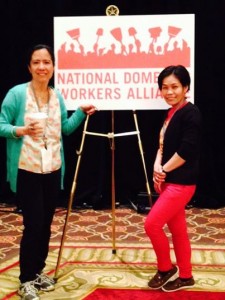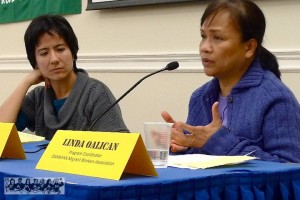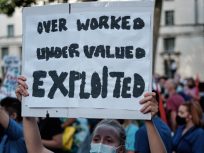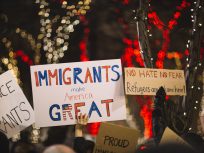By Terri Nilliasca
Terri Nilliasca is a daughter of a Filipina domestic worker and decade long volunteer and ally of Damayan. She is currently working at the United Auto Workers in the Global Organizing Institute assisting in curriculum, research, and leading popular education workshops for members and organizers.
This past weekend, April 26-27, I travelled with Damayan, a Filipino migrant workers center, to Washington, DC for the 4th National Domestic Workers Alliance (NDWA) Congress. It was an uplifting and powerful experience to be among hundreds (about 500) women, mostly immigrant and women of color fighting for better working conditions and dignity and respect. Members of Damayan love travelling together; being a member of Damayan helps to mitigate the profound loss of family and home that is the deep undercurrent to the life of a migrant worker. Workers also found a sense of strength and dignity, being together from across the nation; the diversity, yet similarities of the experiences providing a thread that bound the workers together. This is no small accomplishment given the nature of domestic work – isolated, individual, and denigrated as not actual “work.”
NDWA 2014 Congress
The NDWA was shortly formed after the successful winning of the nations’ first Domestic Workers Bill of Rights. After this victory, funders flocked to the NDWA, to start similar legislative campaigns across the nation. In fact, arguably, the Congress I attended could not have happened without a well-funded Alliance. The question, I reflect on this May Day, is whether these “domestic worker bill of rights” have actually changed the working conditions of domestic workers and whether this legislative tactic is more than a symbolic victory.
On July 1, 2010, both houses of the New York State legislature passed the NY Domestic Worker Bill of Rights (NY DWBR), which extended minimal legal protections to the estimated 200,000 domestic workers in the state, and several months later, Governor Patterson signed it into law. After almost a century of exclusion from legal structures and protections, domestic worker advocates celebrated the passage of the bill as a catalyst to bring the domestic work industry out of the shadows of the “private” home and into the “public” sphere of regulation and public discourse. The DWBR was the nation’s first bill to specifically address the rights of domestic workers. After the NY Bill of Rights was passed, the National Domestic Workers Alliance formed, a well funded organization that has now spearheaded campaigns to pass similar “domestic worker bill of rights” across the United States; successfully passing these new laws, in California and Hawaii, and pending bills in Massachusetts and Connecticut.
The passage of a Domestic Worker Bill of Rights in NY was the culmination of seven years of organizing by a coalition of NY grassroots domestic worker organizations. The decision to spend seven years lobbying and organizing for a “Bill of Rights,” and now the decision to spend many more years to pass similar bills in other states is a decision to invest in formal legal equality. The costs and benefits of that decision remain unevaluated. Several radical lawyers and activists offer us different tools and techniques to evaluate the use of legal reform in organizing campaigns and campaigns for transformational change. The question for activists and allies is whether the legislative campaign and the corresponding cost in time, funding & organizing efforts addresses the stated goal of ending the subjugation of domestic workers.
First, I think it is helpful to look at origins on the NY DWBR. The campaign for the NY DWBR was grounded by a coalition of grassroots organizations consisting of domestic workers. Domestic workers led some of these non-profits but some were led by college educated staff. At one time, the organizations involved were: CAAAV’s Women Workers Project, Andolan: Organizing South Asian Workers, Haitian Women for Haitian Refugees, Unity Housecleaners, Damayan Migrant Workers Association, and Adhikaar for Human Rights and Domestic Workers United. The coalition was named NY Domestic Workers Justice Alliance, although this name and the names of the smaller grassroots organizations are mostly lost in history, with Domestic Workers United (DWU) becoming the face of the movement to pass the legislation in NY. The campaign in New York was remarkable because of its ability to attract allies with institutional power, from labor unions to Left luminaries like Francis Fox Piven. Under DWU’s leadership, there was also a strong relationship with Jews for Racial and Economic Justice (JFREJ), who took the position of organizing employers of domestic workers to embrace the new standards and protections for domestic workers.
Many activists, community leaders, and politicians hailed the passage of the NY DWBR as a victory of momentous proportions. NY Governor Patterson, after signing the Bill into law, proclaimed “Today we correct a historic injustice by granting those who care for the elderly, raise our children and clean our homes the same essential rights to which all workers are entitled.
However, most lawyers, privately, agree that in actuality the protections afforded by the Bill of Rights are minimal, i.e. 3 days paid vacation after one full year at same employer, guarantee of one day of rest off a week, access to workers’ comp, a broad definition of domestic workers as workers under NY Labor law, inclusion in NY Human Rights Law for protection against discrimination. In fact, many of the legal “gains” appears to be merely symbolic and duplicative of legal rights were already codified into law but most domestic workers are unable to enforce. For instance, domestic workers who “live-out” of their employer’s residence were already entitled to overtime under the Fair Labor Standard Act since 1974. Enforcement of individual rights by workers/women of color who are touched by multiple points of systemic oppression is notoriously difficult. The Nation discussed the issues of enforcement in a 2012 article, saying that, “Since November 2010, when the law went into effect, and mid-February of 2012, only five complaints had been brought to resolution.”
Many domestic workers have been able to negotiate much better working conditions for themselves without the use of the DWBR. Filipina domestic workers report that they are often able to negotiate 2 weeks paid vacation and other benefits. One organizer I spoke to explained, “Many of our members are able to negotiate much better conditions than what is provided for under the Bill of Rights, in fact they are nervous that the employer might bring it up as an excuse to offer less. You know, they might say, “Well why should I give you 2 weeks when legally I am only required to give 3 days?” Although, according to this organizer, this never happened, yet it remains a worry for some members.
This story of domestic workers winning better working conditions outside the non-profit industrial complex bring me back to the question of the use of legislative strategies to address systemic oppression. The formation of the National Domestic Worker Alliance, and the launching of a similar campaigns for a Domestic Worker Bill of Rights throughout the US, indicate a significant moment in domestic worker organizing and an opportunity to build a strategic approach to the change that domestic workers seek. The role legislative advocacy can have in winning that transformation is an important question for this struggle.
Social movement activists and scholars have long considered and debated what role legal reform can and should have in creating transformative change. I pose the question as to whether the decision to invest organizing resources, time and money into a legal, reform strategy is worth the minimal legal gains achieved by these Bill of Rights and the potential legitimization of an oppressive system. I also ask the broader question of the role of law reform in social change. I question whether legal reform strategies emerging from professionalized non-profit centered resistance is the most effective method for achieving the change that domestic workers want and need.
Rikke Mananzala and Dean Spade, in their essay, The Nonprofit Industrial Complex and Trans Resistance, present a cautionary note for activists working within the non-profit structure. They identify several key concerns that are applicable in the context of analyzing the use of a legal reform strategy. One concern addresses the tendency for most non-profit groups to hire primarily white, college educated staff and the resulting concentration of power and decision making in the hands of people with class and often times race privilege and not directly suffering the oppression themselves. The authors also raise the issue of decision-making models that are centered in the hands of the people with education, wealth, and class privilege.
In my article, Some Women’s Work: Domestic Work, Class, Race, Heteropatriarchy, and the Limits of Legal Reform, I posed some additional questions to consider, some of which can be answered now and some that are still waiting to be asked. Given the pitfalls of working within the non-profit industrial complex, it is important to also ask questions related to funding and infrastructure. How does a legislative strategy affect funding within the non-profit industrial complex? Does the chosen strategy funnel funding away from efforts to build organizations that are led by domestic workers? Does the campaign for legislation divert funding and resources from smaller, more grassroots domestic worker organizations?
Do these campaigns distribute power from middle-class, college educated, professional organizers to domestic workers or away from domestic workers? How do decisions to compromise on sections of the Bills get made; is it through a difficult, shared decision making process or through backroom deals with lawyers and politicians? And in the evaluation of the alliance work, it is important to ask if one group became the spokesperson for all the groups in the alliance? Did the alliance work help the individual groups grow stronger, or was funding channeled away from the smaller, grassroots groups and towards the group that was advocating for legislative reform?
Today, in NY only a few of the grassroots organizations that were part of the coalition to pass the NY DWBR are still standing, and some are just shadows of their former selves. I am a volunteer attorney with DAMAYAN, one of the founding organizations of the coalition. Legally, our members have seen their lives transformed through immigration remedies for labor trafficking victims but most have rarely used any of the new protections won in the NY DWBR. As people’s lawyers, when evaluating any tactic or strategy, this is where we MUST start – at the real life experiences of those we claim to serve.
Circling back to the NDWA congress, I witnessed a client of mine, a trafficking survivor, give a moving presentation on trafficking with explanations of the root causes of trafficking, the scope of the problem, and a critique of the narrow definition of trafficking under the law. The first time I met this worker he was severely traumatized from his trafficking experience. Through the wonderful work and support of Damayan and Safe Horizons, he is now a leader, even without yet winning his legal case. (His petition is still languishing at USCIS). For me, this was the highlight of the Congress.
However, what struck me about the Congress was what didn’t happen. There was no presentation of the budget, no annual report, no report from the Board of Directors. The BOD consists of domestic workers and some staff from different affiliate organizations; Damayan has 2 members on the Board. The Congress consisted of skill building workshops and unfortunately there was limited time for affiliate organizations to talk, share, and build together. The workshops were not ideological or political but rather skill-based, like “How to Talk to the Media.”
Imagine if there were workshops like “Forced Migration and a Global Economy” or “Immigration and the Global Trade Issues” or “Privatization & Destruction of Public Sector Unions and Domestic Work.” These kinds of workshops give an ideological framework for domestic workers to analyze the root causes of their material conditions.
So this May Day, the question to ask, is how have the lives of domestic workers actually changed by organizing efforts for legal reform? The question needs to be asked of the workers themselves. As Linda Oalican, domestic worker and Overall Coordinator of Damayan said when discussing the importance of a movement led by domestic workers and their experiences, “Buhay natin, ang movement Natin” “This is our lives, our movement.”
Note from Author: This piece reflects my thoughts only and is not the official position of Damayan Migrant Workers Association, their members or their board







